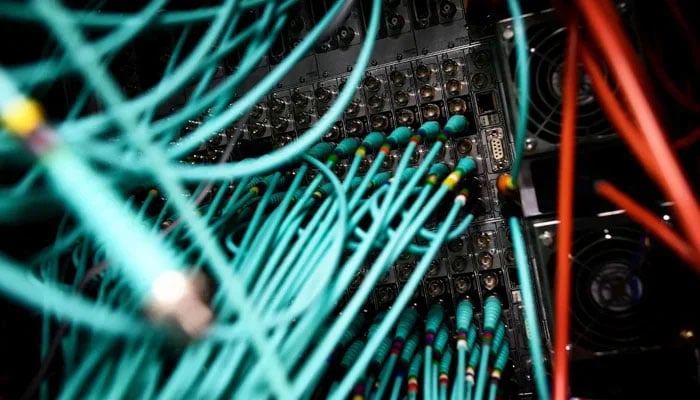Report reveals 15% population remains without internet access, rest suffers through slow speed

A representational image showing internet cables.
KARACHI: Free internet in Pakistan remains a distant dream as the country continues to limit access to content, turn a blind eye to violations of user rights, and create obstacles to internet access.
This has been highlighted in the report titled Pakistan’s Internet Landscape 2022 co-authored by editor Jahanzaib Haque and published by Bytes For All. The report adds that Freedom House’s 2022 Freedom on the Net report has given Pakistan a ranking of 26/100, highlighting how the internet is still “not free” in the country. It also mentions Pakistan’s dismal performance across other key indicators.
Pakistan ranked 118 out of 141 countries in terms of mobile internet speed and 150 out of 178 in terms of fixed broadband speed. The average download speed for both categories range from 10.15 to 15.5 Mbps.
Pakistan also came last out of 22 countries in Asia on the Inclusive Internet Index 2022 – and 79 globally. The index ranks countries on four parameters: Affordability, Availability, Relevance and Readiness. The only commendable achievement it has is in terms of affordability; it is among the countries with the cheapest mobile data plans.
Women in the country too continue to remain deprived of internet access and mobile ownership. The report mentions statistics from the GSMA Mobile Gender Report 2022 that has found Pakistan to have a 33 percent gender gap in terms of mobile ownership, and 38 percent in terms of mobile internet use. Lack of family approval remains a big barrier for women to have access to the internet and to own a mobile phone.
Besides its unsatisfactory performance, Pakistan has also failed to address its infrastructure challenge. The country’s outdated infrastructure and fiber network makes it difficult for Pakistan to introduce emerging technologies in the country. These challenges may make it virtually impossible for the authorities concerned to introduce 5G in the country.
The problem became more pronounced in the year 2022, which also saw a return of prolonged power outages. The electricity shortfall led to “connectivity loadshedding” where people faced cuts in cellular and data services and cellular operators struggled to run their operations amid power cuts. The 2022 floods have created more problems for the operators, leading to significant damages.
As terror returns in the country, Pakistani authorities used the old tactics of limiting or blocking internet access deliberately to prevent militants from carrying out terrorist activities. In Bajaur, internet services remained suspended for at least two months as authorities feared that militants in the region would use mobile services for connectivity.
Crackdown on social media users also led to the arrest of 62 people for blasphemy, according to the report. At least 580 blasphemy cases were registered last year – a 100 percent increase. In the same year, the government nominated PTI leaders in blasphemy cases.
The report includes other horrific statistics as well. In 2021, around two million explicit photos of children were uploaded on social media. Several major arrests were made throughout the year of people involved in either running a child pornography mafia or uploading or sharing explicit photos with other people. WhatsApp and Google Photos helped in the sharing and uploading of such photos.
Besides this, at least 107,493 cybercrime complaints were lodged in 2022. Sixty percent of the complaints lodged by women were against people sexually harassing them through their Facebook accounts.
A high-profile case of the late PTI leader Amir Liaquat led to the arrest of his third and estranged wife who allegedly uploaded Liaquat’s inappropriate photos on social media. Other cybercrime scams included cryptocurrency scams (leading to a total loss of $100 million), fake investment firms, fake job ads targeting the vulnerable, etc. One online Ponzi scheme led by a social media influencer deprived hundreds of people – mostly women – of a collective Rs420 million. The money was collected under the garb of a ballot committee (BC) and was mostly run through Facebook and WhatsApp.












